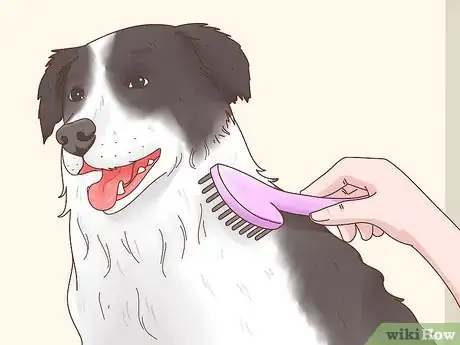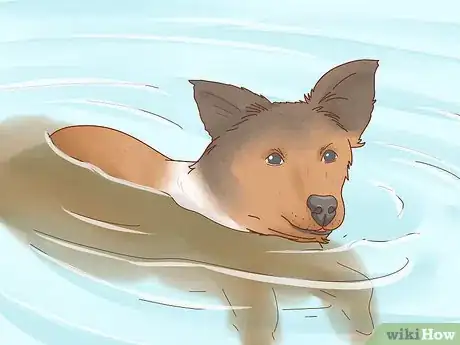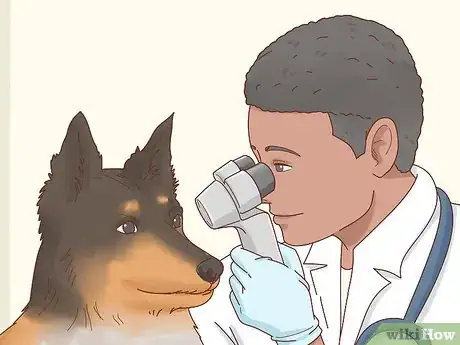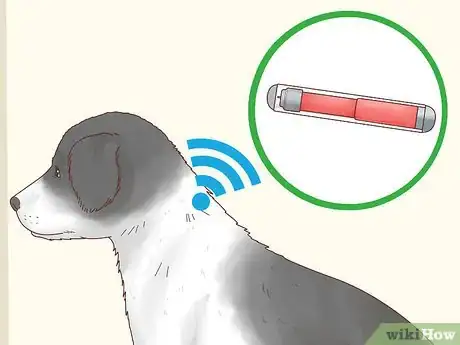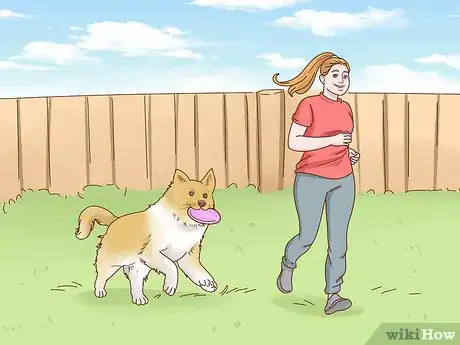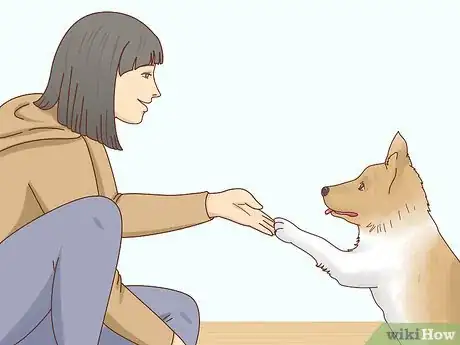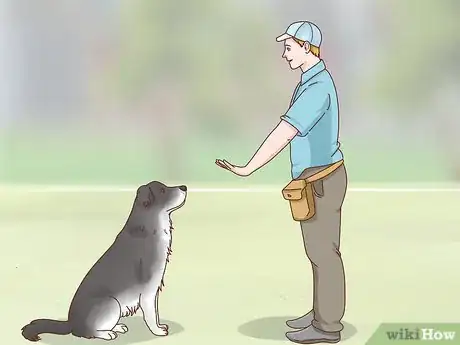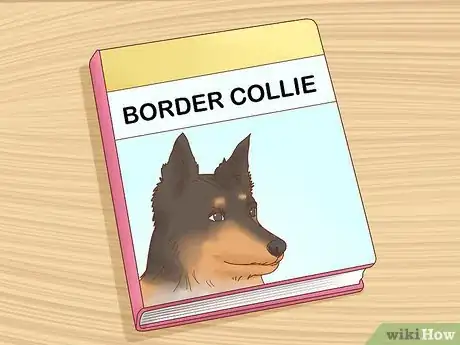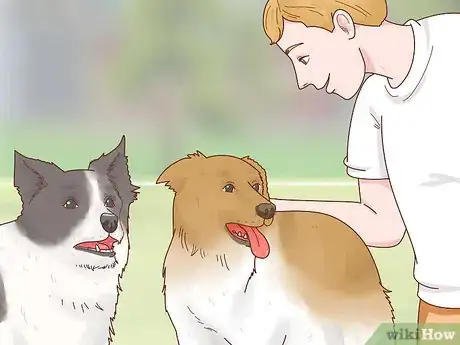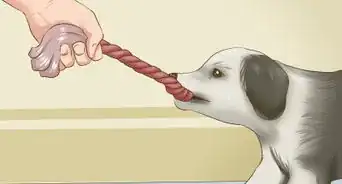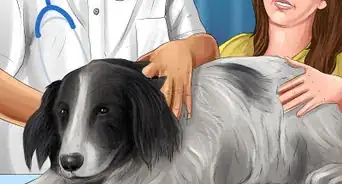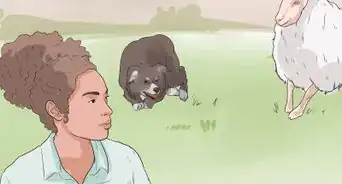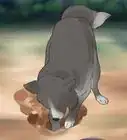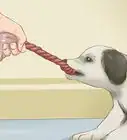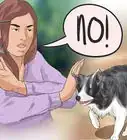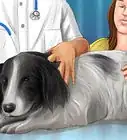This article was co-authored by Brad Greene. Brad is a Certified Professional Dog Trainer (CPDT-KA) and a Fear Free Certified Professional. He is the owner of Fearless Dogs, which is based in the Bay Area of California and has a 5-star rating. Brad specializes in helping clients and their dogs work through challenges using effective and humane behavior change methods, enabling their relationship to thrive. His greyhound, Asher was featured in Greyhound Rescue’s 2022 calendar.
There are 16 references cited in this article, which can be found at the bottom of the page.
This article has been viewed 88,937 times.
Border Collies are an energetic breed known for their herding skills and success in dog sports that test agility. However, due to their natural energy, they need special care. Border Collies can be loyal and fun companions who keep their owners on their toes. But you need to be aware of their need for exercise and activity in their daily life.
Steps
Providing for Your Collie
-
1Purchase the necessities. There are quite a few basic essentials you'll need to buy for your Border Collie so that it will have everything it needs at your home. You should purchase a leash, collar, dog food, food and water dishes, toys, a crate, and a dog hairbrush.[1]
- The leash should be an appropriate length for your Border Collie, and comfortable for you and your dog. This means that it should be long enough to allow your energetic Collie some freedom of movement, but short enough to still maintain control over your dog.
- Avoid retractable leashes as these may encourage your dog to pull. Instead, opt for a long line leash while training your Collie and getting to know their personality better.
- The collar must have an ID tag with your phone number and/or address on it.
- The food and water dishes should be stainless steel if possible.
- Purchase "indestructible" dog toys such as Kong brand toys. Since Collies tend to vigorously chew their toys, this kind will last longer (though most will be destroyed eventually) than stuffed toys or dainty rubber squeaky toys.[2]
- If you want to crate train your Border Collie, be sure to get a crate that is big enough for your pup. The recommended crate size is typically 36 in (91 cm) x 30 in (76 cm).[3]
- Food puzzles are always a great option. There are many commercial options on the market, but you can also make your own with towels or empty containers.
-
2Groom your Collie. Border Collies have long, beautiful coats that require a bit of maintenance. You’ll need to brush them regularly (at least once a week) and give them a bath every 4-8 weeks to help keep their coat clean and healthy.[4]
- Be sure to purchase grooming tools, especially those appropriate for long-haired dogs. This includes a dog hair brush, hair comb, and nail clippers.
- Trim their nails once every 4-6 weeks.
Advertisement -
3Ensure your dog gets plenty of exercise. Because of Border Collies' enormous amounts of energy, at least an hour of exercise every day is a requirement. A daily walk is necessary. And it is preferred to let your Collie run around freely if you have a big fenced in yard.[5]
- You can also burn off energy in more engaging ways such as competing in dog sports like Agility or Flyball, hiking, swimming, or visiting dog parks.
-
4Give your Border Collie quality veterinary care. Though it can seem expensive to take your Collie to the vet, it really is in their best interest and it will save you money down the road. Give your puppy vaccinations. These are absolutely necessary for their health; consult your veterinarian for information on required vaccinations and appropriate ages at which to give them.[6]
- You should also take your Border Collie in for annual veterinarian checkups once they reach adulthood.
- Some common medical conditions Border Collies suffer from include hip dysplasia and several eye/cornea disorders.
- Fix (spay or neuter) your dog. This is a relatively simple operation that will help stop or prevent bad behavior, accidental litters, and certain health issues.[7]
-
5Purchase a microchip for your dog. A microchip is a very small device that stores your contact information so that if your Collie escapes, the shelter or another vet can scan it and contact you to reunite you with your lost pet. Because of Border Collies' intelligence and agility, the chances of your dog escaping is high enough that a microchip is a useful precaution.
- Microchips are relatively inexpensive and can be implanted by your veterinarian.
- Vets usually prefer to implant microchips at the same time as another procedure (like spaying or neutering) to kill two birds with one stone and avoid putting your pet through any additional discomfort.
-
6Choose quality food. Avoid cheap or "bargain" foods – these can lead to health issues down the road like obesity, dental problems, or even kidney disease. Good food is a necessity for your dog, especially a high energy dog like a Border Collie.[8]
- Don’t choose cheap food brands with grain by-products (corn, cornmeal, wheat, etc.) as the first listed ingredient.
- Instead, feed your dog high-quality foods with meat as the main ingredient. Look for foods that contain meat, poultry, or fist as the first listed ingredient.[9]
- Use the serving sizes outlined on the food package as a guideline for how much to feed your dog. Check your dog's body each week, and slightly adjust the amount of food you provide if you notice them unhealthily gaining or losing weight.[10]
-
7Have fun with your Border Collie. It might need an hour and a half of exercise every day, shred your expensive shoes, herd the neighborhood children, or otherwise make a menace of itself, but one thing is for certain: if you're a responsible and educated owner, your Border Collie will be your best friend.
- Border Collies are typically great around children and other pets, especially if they have been raised around them. They might be a bit hesitant around strangers.
Training Your Collie
-
1Try to train the dog yourself. It is important to start training your dog early so that they understand what you want from them from the beginning. Start with showing them what kind of behavior you want and then reinforcing this behavior with treats and praise.[11]
- Though you can start teaching simple concepts (e.g., housebreaking, sleeping in crate, not jumping/biting/dominating people) to young puppies using positive reinforcement, training more advanced obedience is only recommended for puppies four months and older.
-
2Take your Collie to a professional trainer. For a high energy dog like a Collie, obedience training is essential. Not only will it provide essential stimulation for your BC, it will also make your life with an extremely energetic, mischievous dog somewhat easier. A professional trainer will be able to your dog with obedience training so that it will be easier for you to continue the training at home.[12]
- Border Collies are intelligent dogs and often respond best to training techniques in which they can think problems out for themselves, such as clicker training.
- Take some positive reinforcement training classes to learn how to work with your dog. Experiment with different classes to see what you and your dog enjoy, such as agility, nosework, or flyball.
-
3Expand your education. Read books on Border Collies, join an Obedience/Agility group, or talk with experienced BC owners. Do anything to learn more about your beloved pup and what you can do to make their life healthier and happier. Learn about dog nutrition and how important exercise is for your dog’s wellbeing.[13]
- Consult your veterinarian if you have questions about your Border Collie.
Choosing Your Border Collie
-
1Consider carefully. Border Collies (also known as BCs) exceed almost every other dog breed in intelligence and energy, and are only good matches for responsible, dedicated, informed, and experienced dog owners. Never buy a Border Collie because of their cute appearance, or because your friend has a really nice one. And always dedicate a large amount of research time before purchasing or adopting a Collie.[14]
- Border Collies are high energy and require a lot of exercise and room to roam freely. They don’t do well in apartments or confined spaces. They really need a large yard or some land to roam around.[15]
-
2Choose where to purchase your Border Collie. Responsible breeders are the best source for those who desire a show or competition dog; however, if you are interested simply in a quality pet, consider adopting from a specialized breed rescue. This will allow you to give a home to a dog in need while still getting the breed that you want.[16]
- You can sometimes buy a Border Collie from a pet store. But this is not really recommended, as you will generally have no idea of the puppy's health, breeding, or history, and will most likely be supporting a puppy mill.
- You could also consider buying from a "backyard," or casual, breeder. This is also unadvised for the lack of information you will receive about the dog.
- Consider adopting from a shelter. This is a preferred route for those wishing to help dogs in need. But this is often unadvised due to the lack of information and because shelters are often unable to provide for the Border Collies’ special needs, resulting in a badly behaved dog. Adopting from a breed-specific rescue, however, is a reasonable and kind way to acquire your dog.
-
3Interact with many dogs before making a choice. Once you have found some Border Collies, go meet them and see if you like any of them. Remember that this is a big decision and you shouldn’t make it lightly.[17]
- Never adopt a dog sight unseen, no matter how cute it may seem in pictures. You need to interact with the dog in person and make sure there is a connection between you two. You also need to make sure the dog seems healthy.
- Consider bringing your other family members to meet your potential new dog. It is important to gauge how the dog will interact with the whole family.
- You may also want to bring any existing pets to make sure they will get along. You don’t want to accidentally create a situation in which none of your animals can coexist together.
Warnings
- Never, under any circumstances, purchase a Border Collie without thoroughly researching the breed. This breed of dog is high-drive and is not under any circumstance fit for homes that aren't completely devoted.⧼thumbs_response⧽
- Border Collies should never be chained or left alone for hours at a time anywhere. Provide a sturdy kennel if necessary, but avoid this when possible. Border Collies are ideal outside farm dogs and if you are present on your farm every day the dog can be and should be outside to do his job. The danger is leaving the dog alone and frustrated without work to occupy his mind and this can lead to destructive and negative behavior. Border Collies need to interact daily with their handlers and need to multitask. Ideally the dog needs positive reinforcement obedience training and something to herd, or steady training in agility, flyball, and/or Frisbee.⧼thumbs_response⧽
- This is not the dog for the commuter, or apartment dweller. Border Collies need a consistent, daily handler and are ideal for active companionship and service with enough room to run freely.⧼thumbs_response⧽
- Border Collies tend to be one of the most sensitive dog breeds, so try to limit punishments as much as possible.⧼thumbs_response⧽
Things You'll Need
- Dog food
- Water and food bowls, preferably stainless steel
- Brush and nail clippers
- Crate
- Toys able to withstand strong chewing
- Leash and collar with ID tag
- Experienced veterinarian
Expert Interview
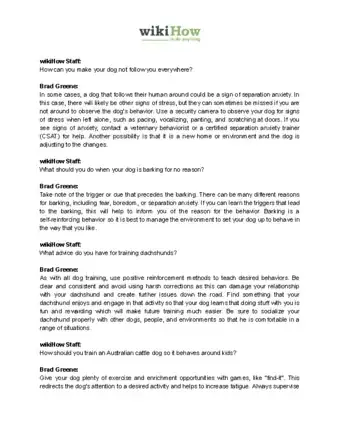
Thanks for reading our article! If you'd like to learn more about pet owning, check out our in-depth interview with Brad Greene.
References
- ↑ http://www.raisingspot.com/adopting/new-puppy-supply-list
- ↑ https://www.kongcompany.com/
- ↑ https://apdt.com/resource-center/choosing-right-crate-size/
- ↑ http://www.espree.com/breedProfiler.asp?g=3&b=10
- ↑ http://www.dogbreedinfo.com/bordercollie.htm
- ↑ http://www.vetstreet.com/dogs/border-collie#health
- ↑ http://www.humanesociety.org/issues/pet_overpopulation/facts/why_spay_neuter.html
- ↑ http://www.onlynaturalpet.com/holistic-healthcare-library/food-diet---general/147/top-10-myths-about-pet-food-and-nutrition.aspx
- ↑ http://www.pfma.org.uk/ingredients-in-pet-food
- ↑ http://www.lovelybordercollie.com/health/feeding
- ↑ http://www.pedigree.com/All-Things-Dog/Article-Library/10-Best-Training-tips.aspx
- ↑ http://www.bordercollie.org/training/basicobed.html
- ↑ http://www.yourpurebredpuppy.com/reviews/bordercollies.html
- ↑ http://www.akc.org/dog-breeds/border-collie/
- ↑ http://www.dogbreedinfo.com/bordercollie.htm
- ↑ http://www.thebordercolliespot.com/
- ↑ http://azbcr.org/Adopt/BeforeYouAdopt.aspx
About This Article
To take care of your border collie, make sure it gets at least 1 hour of exercise every day, since the breed is very high energy. Take it for at least 1 walk a day, and let it run around freely in your fenced-in yard or at the dog park. You should also brush your border collie's long coat once a week to keep it clean and tangle-free. When you're shopping for food for your border collie, look for one that lists meat as the main ingredient, since it will be healthier than dog food that's filled with a lot of grain by-products. Border collies are susceptible to certain medical conditions, like hip dysplasia, so remember to take your furry friend to the vet once a year for a check-up. For advice from our Veterinary co-author, like how to train your border collie, keep reading!

